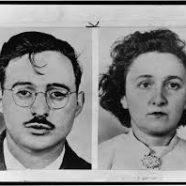The face of evil? The Rosenberg Executions
I’m reading the death sentence handed down to Julius and Ethel Rosenberg by Judge Irving Kaufman in April 1951. The Rosenbergs were accused of spying, of passing nuclear secrets to the Russians. The judge argues that, by his own admission, Julius Rosenberg got a better and fairer trial in America than he could have hoped for in Russia. This galls Kaufman who says that “It is to America’s credit that it took the pains and exerted the effort which it did in the trial.” Still, the defendants devoted themselves to “the Russian ideology of denial of God, denial of the sanctity of the individual, and aggression against free men everywhere.”
No wonder then that Judge Kaufman considers the crime for which the Rosenbergs are about to be sentenced to death “worse than murder.” After all, as he argues, “Plain deliberate contemplated murder is dwarfed in magnitude by comparison with the crime you have committed.” The charges expand as he speaks, getting so large as to blame the Rosenbergs for the death toll (at that stage 50,000) in the Korean War: “I believe your conduct in putting into the hands of the Russians the A-bomb years before our best scientists predicted Russia would perfect the bomb has already caused, in my opinion, the Communist aggression in Korea.” And it gets worse because “who knows but that millions more of innocent people may pay the price of your treason.”
Julius and Ethel Rosenberg went to the electric chair in June 1953. Before they died they wrote letters to each other, to their children. In one letter Julius wrote to his sons Michael and Robert. To Michael he wrote: “I want to tell you that I am confident in the end we will be set free because Mommy and I are innocent and we will fight in every possible way and through the courts to win our freedom as soon as possible.” To Robert: “If you like let me know and I will make more pictures of trains, buses, cars and boats.” Ethel wrote to Julius thus: “At the present moment, with little or no detail to hand, it is difficult for me to make any comment, beyond an expression of horror at the shameless haste with which the government appears to be pressing for our liquidation.” In response Julius wrote of “political frame-ups” and how it would take time “to get them to overcome their inertia but now that grass root sentiments are aroused public opinion will have its effect.” Only a month later however Julius wrote that “the wishes of certain madmen are being followed in order to use this case as a coercive bludgeon against all dissenters.”
The death of the Rosenbergs left its mark in art. Ethel features in Guns ’n’ Roses’ album art for Appetite for Destruction and the executions are mentioned in Sylvia Plath’s The Bell Jar. Even today the name Rosenberg is synonymous with controversy if not with injustice. Senator Joseph McCarthy, in language very similar to Trump’s, talked about “the tempo of Communist victories and American defeats in the cold war” and how America has “failed miserably and tragically to arise to the opportunity” to be the greatest country in the world. People like the Rosenbergs are required, whether they are guilty or not, to provide a focus for political discourse so that people can put a face to evil.
R.H.
Source: Schrecker, Ellen, The Age of McCarthyism: A Brief History with Documents, Bedford Books of St Martin’s Press, 1994






